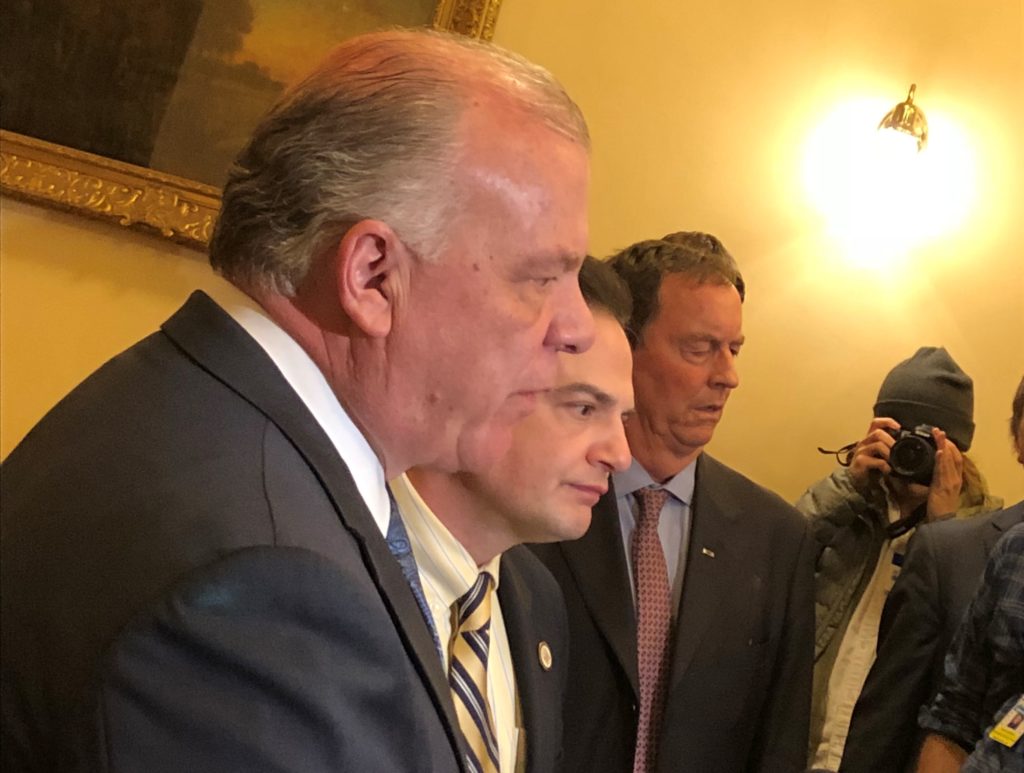Sweeney Challenges CWA Leader on Mischaracterizations of Fiscal Reforms

Sweeney Challenges CWA Leader on Mischaracterizations of Fiscal Reforms
Senate President: Hybrid plan creates greater fiscal stability, keeps all employee contributions in pension system
Trenton – Senate President Steve Sweeney today challenged the mischaracterizations of his proposed fiscal reforms by Hetty Rosenstein, the New Jersey area director for the Communications Workers of America, saying that her descriptions of the substance and impact of the proposals in the “Path to Progress” report are “flat out wrong.”
“Ms. Rosenstein is doing a disservice to the taxpayers and to public employees with her false characterizations of the reforms needed to restore integrity to public finances and prevent a future fiscal meltdown,” said Senator Sweeney. “Our hybrid pension plan will improve the fiscal stability of the pension system for current and retired public employees and save billions of dollars for taxpayers and the state budget.
“Our reforms will create greater fiscal stability, keep all employee contributions within the pension system and continue to provide a defined benefit for all employees,” he said. “That’s why we ruled out a straight 401K plan diversion.”
The pension plan laid out by Senator Sweeney and the bipartisan Economic and Fiscal Policy Workgroup at a series of town halls and academic forums across the state would make New Jersey the 13th state to adopt a hybrid pension system in recent years, joining states like Pennsylvania, Connecticut and Rhode Island.
“Pennsylvania’s public employee unions came together with a liberal Democratic governor and a Republican legislature and adopted a hybrid pension plan last year with little controversy,” Senator Sweeney said. “New Jersey’s public employee unions should support our plan because it keeps the promises we made to current employees and retirees who dedicated years of service to the state and its residents, while it creates a new plan for employees just starting out.”
Under the plan, state, county and municipal employees and teachers with five or more years of service in the Public Employees Retirement System and the Teachers Pension and Annuity Fund would remain in the current pension system with no change in benefits. New hires and non-vested employees with less than five years of service in those plans would be shifted into a new hybrid pension plan.
These newer employees, who would continue to contribute 7.5 percent of their salaries to the pension system, would be shifted a “stacked hybrid” plan that would provide a defined benefit pension on their first $40,000 of annual income and a cash balance account similar to a 401k on income above that. The cash balance account would be managed by the State Investment Council, would be part of the PERS and TPAF pension funds, and would be included in calculations of the pension funds’ future liability.
Employees would be guaranteed a 4 percent annual return on their cash balance or 75 percent of what the pension system earns, whichever is higher. Any earnings above 75 percent would be retained within the pension system, bolstering its funded ratio.
Retirees would be allowed to convert their cash balance account into an annuity to be added to their regular pension, withdraw their cash balance account as a lump sum, roll it over into a 401K or IRA, or keep it in the pension system as a cash balance account to draw from as needed. Those leaving public employment would be allowed to withdraw their cash balance account or roll it over into a 401K or IRA, as current employees are allowed to do with the pension contributions they made.
“We have been working with an actuary to ensure that our package of pension reforms will provide savings and improve the long-term stability of the pension system,” said Senator Sweeney.
Senator Sweeney noted that the Workgroup settled on the hybrid model because it would be better for both employees and taxpayers, and would keep employee contributions in the pension system while reducing long-term risk.
The New Jersey Pension and Health Benefit Study Commission chaired by Tom Healey and Tom Byrne in 2015 recommended a draconian “hard stop” that would have closed off the current pension system and shifted all public employees immediately into a 401k plan.
However, the Economic and Fiscal Policy Workgroup determined that such an approach would be unfair to longtime employees and would violate the non-forfeitable right to future pension benefits earned by vested employees when they reached five years of service that public employee unions secured in previous legislation. In addition, the “hard stop” would be fiscally impractical because pulling employee contributions out of the pension system would add $1.4 billion a year to the state’s annual pension cost.
“Our hybrid pension model is a sensible, middle-of-the-road approach that is fair to both employees and taxpayers,” Senator Sweeney said. “Anyone who asserts that our hybrid plan will hurt the pension system is flat out wrong.”
Senator Sweeney said the hybrid pension plan would be part of the package of legislation introduced later this month to implement recommendations from the Workgroup’s “Path to Progress” (www.pathtoprogress.nj.org) report.









